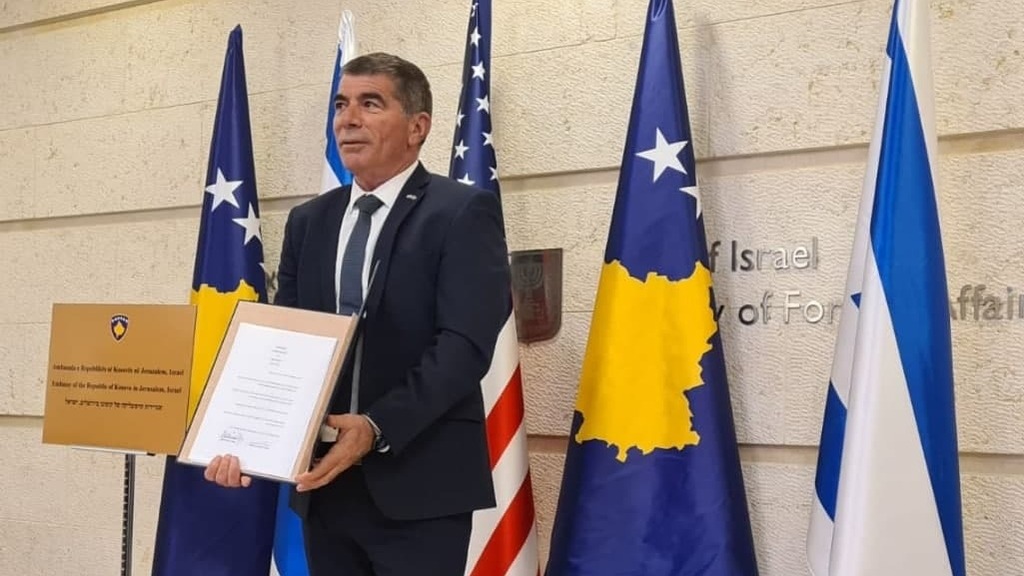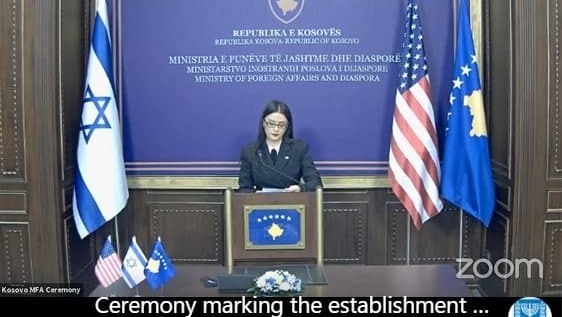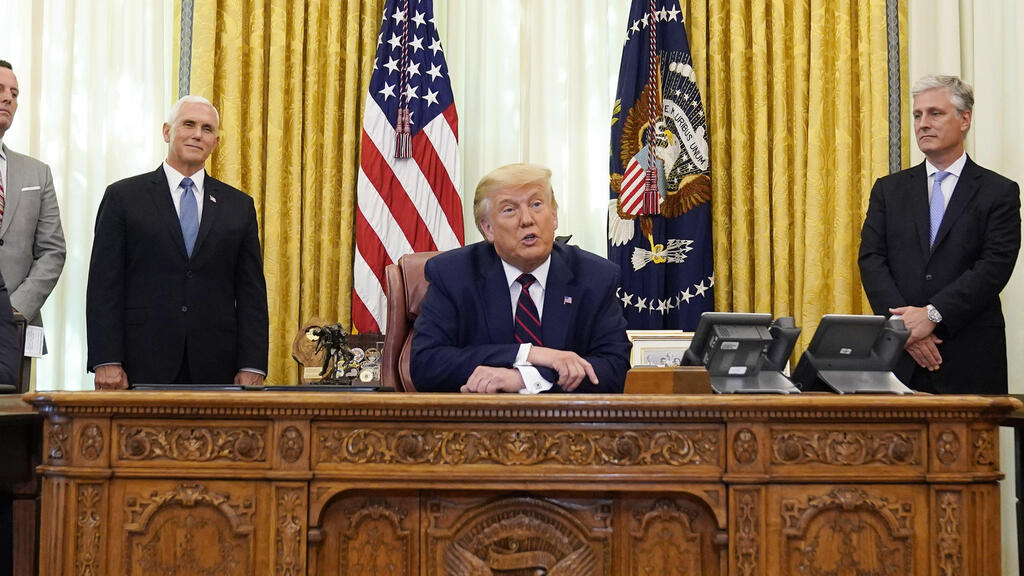If foreign policy were a for-profit business, Israel-Balkan ties would be a growth industry.
Earlier this week, Israel announced its recognition of the disputed southeastern European state of Kosovo.
3 View gallery


Foreign Minister Gabi Ashkenazi displays the agreement between Israel and Kosovo signed at a joint virtual ceremony in Jerusalem and Pristina on Monday
(Photo: Foreign Ministry)
Not only are Israel’s relationships with the West Balkan countries tightening, particularly with Albania and the countries that made up the former republic of Yugoslavia, but the region is a training ground for the country to strengthen its diplomatic skills and become a peace broker on the world stage.
Last September, then-U.S. president Donald Trump recognized Israel as being crucial to the agreements on economic normalization between Kosovo and Serbia, as each signed parallel documents with the US.
“Israel was able to provide something to make that deal happen,” says Dr. Yonatan Freeman, an international relations expert at the Hebrew University of Jerusalem. “That shows the growing diplomatic power Israel has.”
“Kosovo also shows that Israel can serve as a mediator when it comes to conflicts that may be unrelated to it,” he says.
“I won’t be surprised in the future if Israel becomes involved in agreements between countries far away from Israel, in terms of getting both sides to the table and providing something that both sides can get to make the agreement possible.”
Now that Israel has acknowledged Kosovo’s independence, Jerusalem has diplomatic ties with all of the Balkan countries and is generally on good terms with the powers in the region.
“Our closest ally is no doubt Serbia, but we also have very close and good relations both with Macedonia and Albania. We also very close relations with Montenegro,” says Ambassador Dan Orian, head of the Balkans department at Israel’s Foreign Ministry and nonresident ambassador to North Macedonia.
Orian says that Israel’s nonresident ambassador to Montenegro, Yahel Vilan, who is based in Belgrade and is also envoy to Serbia, presented his credentials to Montenegro’s President Milo Đukanović on Tuesday, and met with the country’s Prime Minister Zdravko Krivokapić and Foreign Minister Đorđe Radulović on Wednesday.
Orian describes Israel’s relationship with Bosnia and Herzegovina as “correct,” which means “good, but less warm” due to the powerful influence of the ethnic minority Bosniaks, who tend to be less pro-Israel and more influenced by Turkey and Iran.
Israel’s recognition of the Republic of Kosovo is a major accomplishment for the latter, which declared itself a state 13 years ago.
“Israeli recognition is a very important step for Kosovo,” says Dr. Faruk Ajeti, a research fellow at the Austrian Institute for International Affairs who focuses on the Balkans.
“For two years, no new countries have recognized Kosovo, and Israel’s move might spur recognitions from new countries.”
Greg Delawie, a former U.S. ambassador to Kosovo, also thinks other countries could follow in Israel's footsteps and recognized the landlocked Balkan country.
“I think Israel’s recognition of Kosovo should help encourage other states who have not recognized Kosovo to follow Israel’s lead, which I think would be terrific,” he says.
Freeman says Israel’s decision to acknowledge Kosovo as a country is also significant because it has long looked up to the Middle Eastern country.
“Kosovo sees Israel as a model for how you build a country after war, after lots of losses … how we can get to a strong country,” he says.
“They also had their own challenges with refugees of their own with the ethnic Albanians,” he added.
Kosovo is an almost entirely Muslim nation composed primarily of ethnic Albanians. Serbia considers Kosovo an important part of its country, since it contains religiously significant locations for the Serbs.
More than 10,000 people died in the 1998-1999 Kosovo War in which NATO intervened to remove Serbian forces from Kosovo.
3 View gallery


Kosovo's Foreign Minister Meliza Haradinaj at the virtual ceremony in Pristina on Monday
Freeman says that Israel benefits greatly from its new ties with Kosovo and from peace in the Balkans in general.
“We have to gain, on the one hand, a new market for fields like agriculture, energy and infrastructure, as well as a new ally in the fight against Islamic extremism against Iran,” he says, adding that both Kosovo and Serbia have agreed to place Hezbollah on their terrorist lists.
“Areas that are more stable in terms of economics and politics and everything else are less likely to be used by those threatening Israel security,” Freeman says.
“We want to make sure Iran doesn’t use that instability for its own benefit … Increasing the security of those in the [Balkans] area also increases our security over here.”
This sentiment is echoed by Orian when talking about the agreements reached last September by the former warring sides.
“At the end of the day, any good economic steps that are happening in the Balkans are good for us, and we see this as an agreement of stabilization of the Balkans, which is good for everybody,” Orian says.
However, Jan Pieklo, a former Polish ambassador to Ukraine who works as an expert for the European Parliament on the Balkan countries, contends that the significance of the relationship between Kosovo and the Balkans in general is trumped by other matters.
“Kosovo and the Balkans are not the top priority of the Israeli government” and vice versa, he says. “They have more pressing concerns closer to home.”
3 View gallery


Former U.S. president Donald Trump announces a Kosovo-Serbia deal that includes Israel's recognition of Kosovo, at the White House in Sept. 2020
(Photo: AP)
Orian acknowledges that recognizing Kosovo might hurt Israel’s relationship with Belgrade in the short term.
“No doubt that Serbia is far from happy about it. Kosovo is, as they say, ‘their Jerusalem,’” he says.
“But they have many friends that recognized Kosovo, from us [Israel] to France and Germany and many others. Yes, it will for a while be harder since Serbia is very close to us.”
“We hope that they will fulfill the commitments they made in Washington. They knew that it is part of the deal,” Orian adds, referring to, among other things, Serbia’s promised embassy move to Jerusalem.

